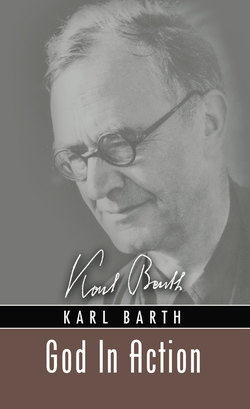Читать книгу God In Action - Karl Barth - Страница 6
На сайте Литреса книга снята с продажи.
ОглавлениеINTRODUCTION
AMERICAN religious leaders are beginning to manifest a new interest in basic theological problems. The reasons for this are quite evident. Our feverish activism, our easy optimism, and our confidence in automatic inevitable progress have been severely shaken and have given place to a feeling of helpless bewilderment. It is in such times of confusion and uncertainty that men seek the deeper realities of life. The periods of great theological vigor were also the periods of widespread confusion and disorder. Augustine wrote his Confessions while the Roman empire was breaking under the pressure of the invading barbarians. Calvin’s Institutes came out of the religious and political turmoil of his time and was written in flight from political injustice. The great vital productive ages in the history of the Church were the “creed-making,” not the “creed-reciting” ages. It is when men wrestle with truth, when they face the deepest problems of life, which are always theological, that the Church is established through the witness to the truth.
Of course, we still have those who have “done” with theology—though as a matter of fact they never began. But there is a growing number among us, who are earnestly seeking sounder foundations, who are looking away from the frail supports of man-made plans and human ways, unto the living God revealed in Jesus Christ. To such these chapters will be a welcome aid in their search.
These chapters will also be of interest to those who are trying to learn what Karl Barth stands for in the theological world. For the English reader it has been difficult to obtain first-hand information, especially as to Barth’s positive and constructive theology. Much, indeed, has been written about him, but both his friends and his foes, by their interpretations and criticisms, have frequently beclouded the real issues. The two volumes of sermons by Barth and Thurneysen have done much to acquaint the English reader with the religious ideas of the movement. They have demonstrated that this theology can be translated into soul-searching, pungent sermons, which is ever the final test of any theological system.
This volume is not presented as a complete system of Barthian theology. Nevertheless, the table of contents will show that the subjects have been selected with a view to presenting the main theological contributions which Barth has made to our generation. The selection was made from a series of brochures, published under the title of Theologische Existenz Heute, edited by Karl Barth and Eduard Thurneysen. These brochures are mostly lectures delivered before eager groups of ministers, and addresses and sermons before large audiences. They are, therefore, not merely the academic product of the professor’s sanctum but issue from the battlefront of an intense religious struggle, at a time when it is not “all quiet on the western front.” The chapter on the Church reveals with refreshing clarity Barth’s position in the German church conflict. He simply holds to a definite conception of the Church. He does not antagonize any form or theory of government. He is not crusading against socialism or communism. He is not concerned with theories of government or policies of administration but with God and His Church. His Church stands there like a rock in a surging sea. It may be a storm center; the roar of many waters may resound mightily; the foamy billows may rise high, and even for a time submerge it; all this not because the rock has gone out to battle the sea but because the sea has struck something solid.
Those who grasp Barth’s ideas regarding Revelation, the Church, the Christian Ministry, etc., will see why one cannot properly speak of “Barthianism” or a “Barthian School.” The whole emphasis is on something beyond Barth or any group of men. Barth is a witness to the truth and a witness is of only relative significance.
But it is not the purpose of the introduction to interpret Barth or the contents of this book. The important thing is that Barth here speaks for himself. There is good reason to believe that the English-speaking public will be glad for the opportunity to hear him. The translators, as well as the author, have no other aim than to bear witness to the truth, for the glory of God.
JOSIAS FRIEDLI.
Mission House, 1935.
